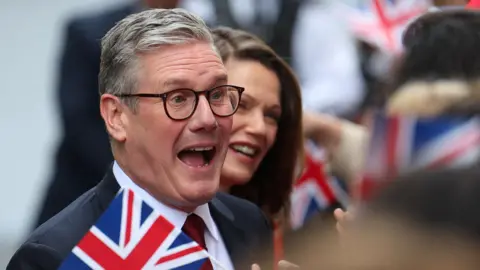ARTICLE AD BOX
1 hour ago
By Henry Zeffman, Chief Political Correspondent

 Reuters
Reuters
A little after midday, as scores of sleep-deprived Labour activists and campaign staff thronged into Downing Street to welcome their new prime minister, I saw one of them literally pinch himself.
That’s - almost - all you need to know about the mood in the Labour Party right now: jubilation blended with disbelief.
When Rachel Burden read out the exit poll in our radio studio, Wes Streeting’s eyes welled with tears. With a light sprinkling of exceptions, this is a generation of Labour politicians, activists and officials who have known only defeat. The simple fact is that the Labour Party loses more elections than it wins.
To have voted for a Labour election winner other than Tony Blair, until last night you had to be at least 68 years old.


News of the exit poll started the waterworks for Mr Streeting
That is the scale of Sir Keir Starmer’s achievement, and that is why the Labour Party is jubilant today.
And it went beyond mere victory. Labour have a vast majority in parliament. They will govern essentially as they please. That is the most important development of the election for how we will live our lives, for what this country is going to be like and become over the next four or five years.
But there is a pretty big wrinkle, personified by Jon Ashworth and Thangam Debonnaire. They are the two shadow cabinet ministers who did not walk up Downing Street to join the real cabinet today.
That wasn’t Sir Keir’s decision. Ms Debonnaire was ousted on an enormous 28.2% swing by the Greens in Bristol Central. Her loss had been widely anticipated but was no less gutting when it came.
“Thangam is a real trooper,” a senior Labour source said. “She’s taken a lot of flak backing difficult positions, she’s a big part of the team. That one is really going to hurt.”
Note the tense there. I got that quote a few days before the election. Labour had essentially pre-grieved Ms Debonnaire’s defeat.
Mr Ashworth’s, by contrast, was a total shock - perhaps the biggest surprise in a night not short of them. I inadvertently broke the news to one senior Labour official who had taken a few hours of sleep. Their response is not suitable for publication.
Those who had been awake described as “by far the lowest moment” of the night a hour in which Labour lost Mr Ashworth’s seat to an independent, its neighbouring seat to the Conservatives, failed to take Chingford and Woodford Green due to a split in the left-wing vote, and lost Islington North to Jeremy Corbyn, now an independent.
Mr Ashworth's defeat, as with the other handful of seats Labour lost this way, spoke to a clear vulnerability in the Labour coalition. More MPs came close to losing to independents - Mr Streeting and Jess Phillips by just a few hundred votes; Shabana Mahmood, the new justice secretary, by a touch over 3,000 votes.

 Reuters
Reuters
It's been a long wait for Labour supporters to experience a general election victory.
Other senior Labour figures faced a different challenge. While no Labour MPs came close to losing to Reform UK, there were large swings to Nigel Farage's party in many seats, including Deputy Prime Minister Angela Rayner's and Home Secretary Yvette Cooper's.
It may be that seats like that have a different strategic imperative over the coming years than seats like Mr Streeting’s, or inner-city seats where Labour have lost ground to the Greens.
Plenty of those I spoke to overnight looked at what is happening in France and the US among other countries and saw parallels.
“Like much of the rest of the Western world, we are moving into a more chaotic, unpredictable politics. But first past the post is saving us from the worst extremes,” one MP told me.
Another Labour official was more pithy: “This is a nuts election.”



 9 months ago
80
9 months ago
80








 English (US) ·
English (US) ·